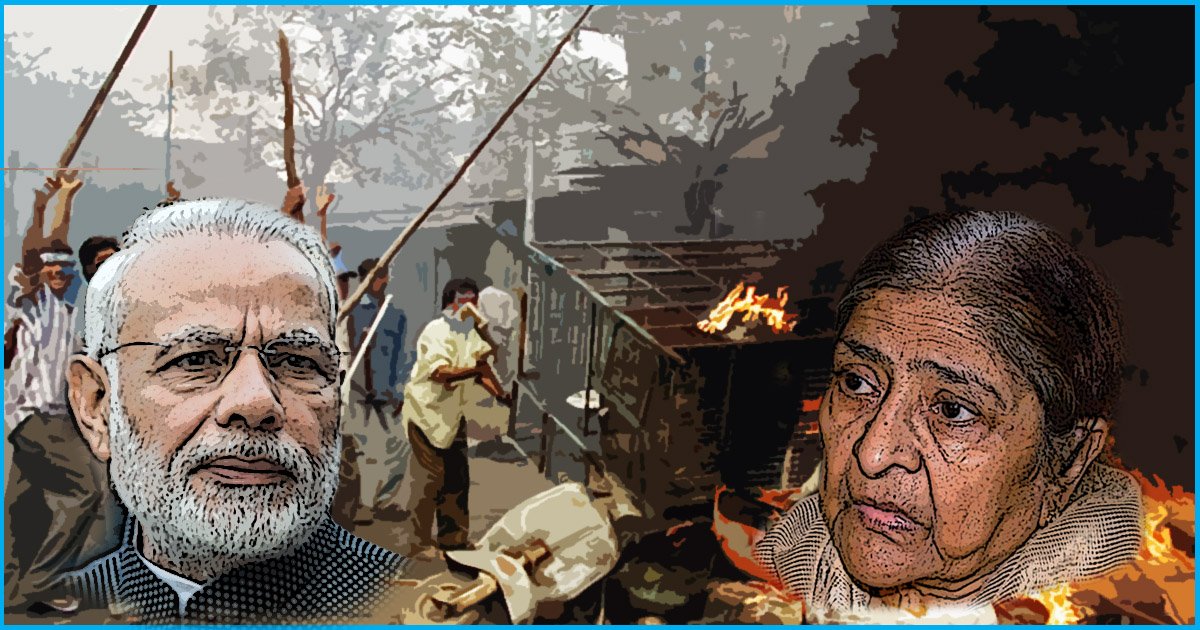
Gujarat HC Upholds Clean Chit To PM Modi And Others In Gulberg Riots Case
The Gujarat High Court upheld the closure report of the Special Investigation Team ( SIT) that had given a clean chit to Prime Minister Narendra Modi. It dismissed the allegation made by Zakia Jafri, the widow of slain former MP Ehsan Jafri, that the former Gujarat Chief Minister and others on allegations of a larger conspiracy in connection with the 2002 post-Godhra riots.
Her plea met partial success as Justice Sonia Gokani agreed that further investigation could still be ordered into the case, contrary to the finding of the trial court.
Background
The SIT’s closure report, filed on 8 February 2012, served a clean chit to PM Modi and others in connection with the Godhra riots. In December 2013, the metropolitan magistrate’s court rejected Jafri’s petition against the report, after which she moved the high court in 2014.
Jafri and the activist Teesta Setalvad’s NGO Citizen for Justice and Peace had challenged the magistrate court’s order that upheld the special investigation team’s clean chit to the then chief minister of Gujarat and others in connection with the 2002 post-Godhra riots.
The hearing of the petition before Justice Sonia Gokani concluded on 3 July.
The petition had demanded that PM Modi and 59 others, including senior police officers and bureaucrats, be made accused of allegedly being a part of the conspiracy that fanned the riots.
It had also sought the high court’s direction for a fresh investigation into the matter.
Arguments and counter-arguments
The SIT submitted before the High Court that the investigation was carried out under the supervision of the apex court and that it was widely accepted by all. It claimed that the lower court looked into all aspects of allegations to conclude that there was no further need to investigate the matter from the angle of “larger conspiracy”.
Zakia Jafri’s lawyer, Mihir Desai has, however, pointed out a different side to the entire issue. He argued in the HC that the magistrate while accepting the SIT’s closure report, did not even consider other options such as rejecting the report or ordering a fresh probe.
The lower court ignored the Supreme Court guidelines and did not consider signed statements of witnesses which suggested that there was a conspiracy, he argued.
Submissions of key witnesses such as (former IPS officers) Sanjiv Bhatt, RB Sreekumar and Rahul Sharma and the findings of Tehelka magazine’s sting operation have also been ignored, Desai added.
Desai alleged that the riots which could have been prevented were only encouraged by certain ministers, police officers and bureaucrats.
The Gulberg riots
Ehsan Jafri, a Congress leader, was among 68 people who were killed at the Gulberg Society when a mob attacked it on 28 February 2002, a day after the Godhra train burning incident which set off riots in the state.
Mobs went haywire killing Muslims and burning down their homes in 2002 in retaliation. PM Modi and his top officers were at the time accused of being complicit in the violence, a charge that was rejected by a Supreme Court-monitored special investigation team.
The Logical Indian urges the authorities to look into the matter and ensure a proper investigation into the matter. Keeping in mind the several arguments by the petitioner’s lawyer, it is essential that no biased judgement is meted out.
In a country like India where communal harmony is essential to its secular and democratic fabric and which breaks into disruption at the slightest instigations, judgements like these particular bear weight. It is essential that rulings in these cases work as precedents that would reinstate our belief in the judiciary.
 All section
All section













